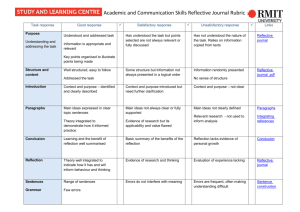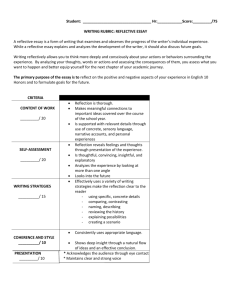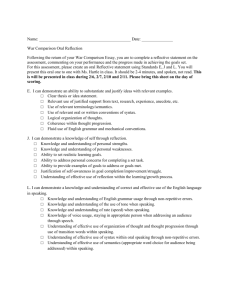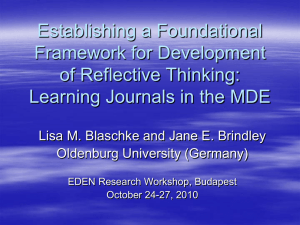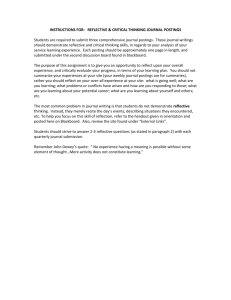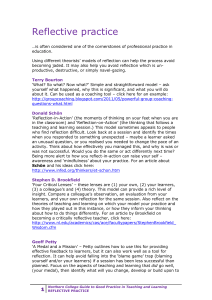Collection of Quotes about Reflection and Reflective Practice
advertisement
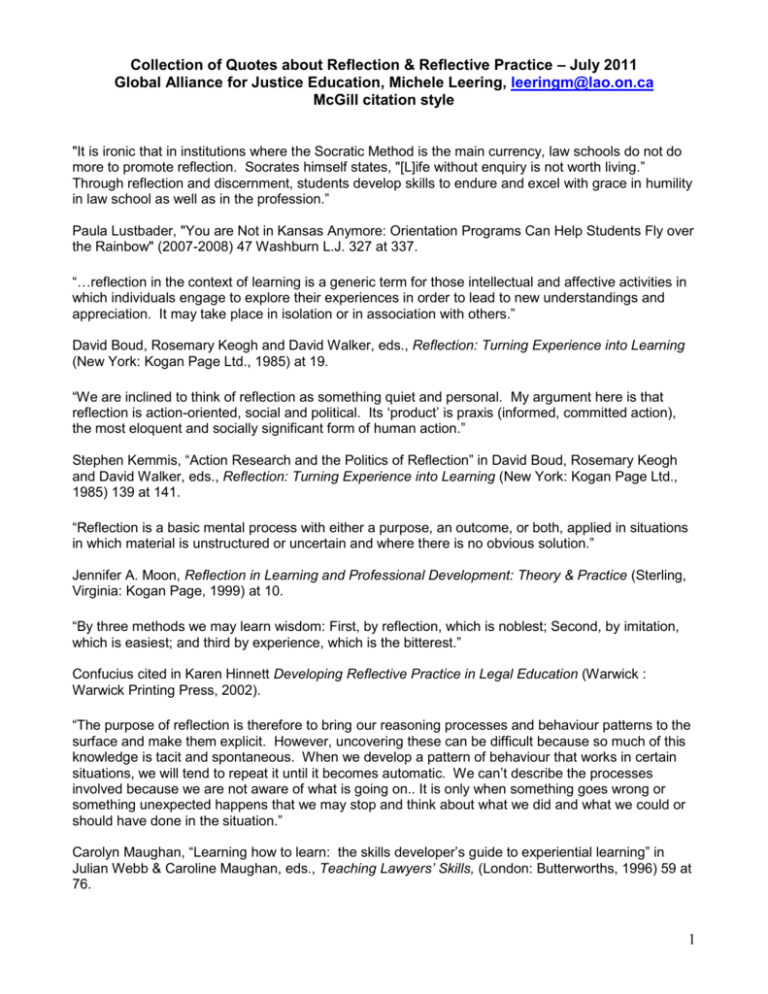
Collection of Quotes about Reflection & Reflective Practice – July 2011 Global Alliance for Justice Education, Michele Leering, leeringm@lao.on.ca McGill citation style "It is ironic that in institutions where the Socratic Method is the main currency, law schools do not do more to promote reflection. Socrates himself states, "[L]ife without enquiry is not worth living.” Through reflection and discernment, students develop skills to endure and excel with grace in humility in law school as well as in the profession.” Paula Lustbader, "You are Not in Kansas Anymore: Orientation Programs Can Help Students Fly over the Rainbow" (2007-2008) 47 Washburn L.J. 327 at 337. “…reflection in the context of learning is a generic term for those intellectual and affective activities in which individuals engage to explore their experiences in order to lead to new understandings and appreciation. It may take place in isolation or in association with others.” David Boud, Rosemary Keogh and David Walker, eds., Reflection: Turning Experience into Learning (New York: Kogan Page Ltd., 1985) at 19. “We are inclined to think of reflection as something quiet and personal. My argument here is that reflection is action-oriented, social and political. Its ‘product’ is praxis (informed, committed action), the most eloquent and socially significant form of human action.” Stephen Kemmis, “Action Research and the Politics of Reflection” in David Boud, Rosemary Keogh and David Walker, eds., Reflection: Turning Experience into Learning (New York: Kogan Page Ltd., 1985) 139 at 141. “Reflection is a basic mental process with either a purpose, an outcome, or both, applied in situations in which material is unstructured or uncertain and where there is no obvious solution.” Jennifer A. Moon, Reflection in Learning and Professional Development: Theory & Practice (Sterling, Virginia: Kogan Page, 1999) at 10. “By three methods we may learn wisdom: First, by reflection, which is noblest; Second, by imitation, which is easiest; and third by experience, which is the bitterest.” Confucius cited in Karen Hinnett Developing Reflective Practice in Legal Education (Warwick : Warwick Printing Press, 2002). “The purpose of reflection is therefore to bring our reasoning processes and behaviour patterns to the surface and make them explicit. However, uncovering these can be difficult because so much of this knowledge is tacit and spontaneous. When we develop a pattern of behaviour that works in certain situations, we will tend to repeat it until it becomes automatic. We can’t describe the processes involved because we are not aware of what is going on.. It is only when something goes wrong or something unexpected happens that we may stop and think about what we did and what we could or should have done in the situation.” Carolyn Maughan, “Learning how to learn: the skills developer’s guide to experiential learning” in Julian Webb & Caroline Maughan, eds., Teaching Lawyers’ Skills, (London: Butterworths, 1996) 59 at 76. 1 “The insistence that the oppressed engage in reflection on their concrete situation is not a call to armchair revolution. On the contrary, reflection – true reflection – leads to action.” Paulo Freire, Pedagogy of the Oppressed (New York: Continuum, 2000) at 66. "Raelin… argues that reflection is fundamental to learning and that it provides a basis for future action. We cannot learn from our actions unless we are aware of the consequences of our behavior. There is a gap between what we think we do- 'espoused theory'- and what our behavior shows'theory in use' (Argyris and Schön, 1978). Senge (personal conversation, 1999) states that 'our core challenge is to become more reflective on the reasoning that guides our actions and gradually improve our theories-in-use'.” K. Ayas & N. Zeniuk, “Project-based Learning: Building Communities of Reflective Practitioners” in Christopher John Grey & Elena Antonacopoulou, eds., Essential Readings in Management Learning (Thousand Oaks, CA: Sage, 2004) 271 at 272. “Teachers of law need ways of thinking and talking about legal education that will help us and help our students to confront, critique, and “see through” the prosaic, technical legalism of law school. We need a language that makes rather than denies meaning. To engage in the everyday reality of becoming a lawyer without reflecting on where it is taking us and what kind of journey it may turn out to be, or on how we are remaking ourselves to serve purposes we abhor, means that we give up on our own souls.” James R. Elkins, “Writing Our Lives: Making Introspective Writing a Part of Legal Education” (1993) 29:1 Willamette L. Rev. 577 at 597. “It’s hard to look at modern life and see our capacities for reflection or meaning-making. We don’t use our gifts to be more aware or thoughtful. We’re driven in the opposite direction. Things move too fast for us to reflect, demanding tasks give us no time to think, and we barely notice the lack of meaning until forced to stand still by illness, tragedy, or job loss. But in spite of our hurry, we cannot stop life’s dynamic of self-reference or the human need for meaning. If we want to influence any change, anywhere, we need to work with this powerful process rather than deny its existence.” Margaret J. Wheatley, Leadership and the New Science (San Francisco: Berrett-Koehler Publishers Inc., 2006) at 147. Donald Schön describes reflection as enabling one to uncover knowledge in and on action. “Schön suggests that, in practice, reflection often begins when a routine response produces a surprise, an unexpected outcome, pleasant or unpleasant. The surprise gets our attention. When intuitive, spontaneous performance yields expected results, then we tend not to think about it; however, when it leads to surprise, we may begin a process of reflection.” Elizabeth Anne Kinsella, “Technical Rationality in Schön’s Reflective Practice: Dichotomous or NonDualistic Epistemological Position” (2007) 8 Nursing Philosophy 102 at 108. “Experience is valuable in helping us to reflect on how we learn - particularly on how, as learners, we experience the interplay between cognition and metacognition. This is crucially important in shaping the effectiveness of learning and in influencing students’ motivations to learn.” Julian Webb, “The “Ambitious Modesty” of Harry Arthurs’ Humane Professionalism” (2006) 44 Osgoode Hall L.J. 119 at 151. 2 “The outcomes of reflection may include a new way of doing something, the clarification of an issue, the development of a skill or the resolution of a problem. A new cognitive map may emerge, or a new set of ideas may be identified. The changes may be quite small or they may be large. They could involve the development of perspectives on experience or changes in behaviour. The synthesis, validation and appropriation of knowledge are outcomes as well as being part of the reflective process. New links may be formed between previously isolated themes and the relative strengths of relationships may be assessed. Again, a significant skill in learning may be developed through an understanding of one’s own learning style and needs.” David Boud, Rosemary Keogh and David Walker, eds., Reflection: Turning Experience into Learning (New York: Kogan Page Ltd., 1985) at 34. “Opening the contemplative mind in schools is not a religious issue but a practical epistemic question... Inviting contemplative study simply includes the natural human capacity for knowing through silence, pondering deeply, beholding, witnessing the contents of consciousness and so forth. These approaches cultivate an inner technology of knowing and thereby a technology of learning and pedagogy without any imposition of religious doctrine whatsoever. If we knew a particular and readily available activity would increase concentration, learning, well-being and social emotional growth, and catalyze transformative learning, we would be cheating our students to exclude it. Long dormant in education, the natural capacity for contemplation balances and enriches the analytic. It has the potential to enhance performance, character and the depth of the student's experience." Tobin Hart, “Opening the Contemplative Mind in the Classroom” (2004) 2 J. Transformative Educ. 28 at 29. “A practitioner’s reflection can serve as a corrective to over-learning. Through reflection, he can surface and criticize the tacit understandings that have grown up around the repetitive experiences of a specialized practice, and can make new sense of the situations of uncertainty or uniqueness which he may allow himself to experience.” Donald A. Schön, The Reflective Practitioner: How Professionals Think in Action (New York: Basic Books Inc., 1983) at 61. Reflective practice is “a dialogue of thinking and doing through which I become more skillful.” Donald A. Schön, The Reflective Practitioner: How Professionals Think in Action (New York: Basic Books Inc., 1983) at 31. “In the varied topography of professional practice, there is a high, hard ground where practitioners can make effective use of research-based theory and technique, and there is a swampy lowland where situations are confusing “messes” incapable of technical solution. The difficulty is that the problems of the high ground, however great their technical interest, are often relatively unimportant to clients or to the larger society, while in the swamp are the problems of the greatest human concern.” Donald A. Schön, The Reflective Practitioner: How Professionals Think in Action (New York: Basic Books Inc., 1983) at 42. 3 Reflective practice begins “where practitioners are problematizing their practice and learning afresh about both the knowledge and skills and attitudes that their practice demands.” Peter Jarvis, The Practitioner-Researcher: Developing Theory from Practice (San Francisco: JosseyBass, 1999) at 178. “The capacity to reflect on one's own strength and weaknesses, to learn from constructive criticism, and to practice critical reflection by monitoring one's own work performance and interpersonal interactions is essential to the ability to learn from experience and is the cornerstone of the journey to becoming a lifelong learner. While reflective practice is a desired attribute of law graduates, it is currently not widely adopted in legal education." Judith McNamara & Rachel Field, “Designing Reflective Assessment for Workplace Learning in Legal Education” (Paper presented at the ATN Evaluation and Assessment Conference, 29-30 November 2007) online: <http://www.eac2007.qut.edu.au/proceedings/proceedings_ebook.pdf> 87. “The Reflective Practitioner engages in what Lucie White has called "situated theoretical practice." In this view theorizing is a necessarily partial, provisional, and perspectival activity. It is an approach that acknowledges the manner in which subjects are socially constructed, and acknowledges particularly how the differing social and cultural understandings of lawyers and clients complicate their interactions. Reflective practice is a bottom-up, rather than a top-down, approach to knowledge. In contrast to older, more static and more authoritative approaches to theory-building, the Reflective Practitioner continually engages the humble process of revising and reinterpreting her understandings and strategies in accordance with the new situations and experiences that she encounters in her practice.” Ruth Margaret Buchanan, "Context, Continuity, and Difference in Poverty Law Scholarship" (19931994) 48 U. Miami L. Rev. 1000 at 1035. “By reflecting on the ideological factors, and the politics that inform our workplaces, we can become what Giroux calls transformative intellectuals. We can begin to rethink and reform the traditions that may prevent us from becoming active reflective practitioners (Giroux, 1998). Reflection on practice thus leads us to a closer examination of the contexts of our clients’ lives, the contexts of our practices, and the systematic factors that influence both of these. The insight that we gain through reflection can provide a foundation for our actions, as we advocate for our clients and for systemic change.” Elizabeth Anne Kinsella, “Reflections on Reflective Practice” (2001) 68 Can. J. Occupational Therapy 195 at 197. “Reflective practice has its roots in the Enlightenment idea that we can stand outside of ourselves and come to a clearer understanding of what we do and who we are by freeing ourselves of distorted ways of reasoning and acting. There are also elements of constructivist phenomenology in here, in the understanding that identity and experience are culturally and personally sculpted rather than existing in some kind of objectively discoverable limbo.” Stephen D. Brookfield, Becoming a Critically Reflective Teacher (San Francisco: Jossey-Bass, 1995) at 214. 4 “A reflective practice model encourages the development of both cognitive and affective theories of moral and ethical behaviour, challenging students to integrate these into their personal belief systems as a result of their experiences instead of (at best) passively absorbing the “rules” of professional conduct.” Julia Macfarlane, “Assessing the “Reflective Practitioner: Pedagogic Principles and Certification Needs.” (1998) 5:1 Int’l J. Legal Prof. 63 at 78. “.. the “reflective practitioner” model seeks to integrate knowledge and skills. Starting from the premise that law only has meaning through its application to concrete situations and through its effects upon society, “reflective practitioner” – oriented education would emphasize that knowledge is best acquired through learning that is “dynamic, open-ended and contextual.” Promoting reflection, rather than just narrowly conceived “competency,” “reflective practitioner training would emphasize reflectiveness, the exploration of feelings, self-awareness and self-appraisal.” “Knowledge,” under this model includes the development of responsive to change, flexibility and professional self-growth rather than merely on knowledge of the black letter legal ruses. Such an education would encourage team work as fostering self-reflection and awareness of the learning process. (cites omitted) Annie Rochette & Wesley W. Pue, “Back to Basics? University Legal Education and 21st Century Professionalism” (2001) 20 Windsor Y.B. Access Just. 167. “Each of us can bring the practice of wisdom into our careers, our politics, and the life choices we make, deepening and empowering our work for a more just, sustainable, and reflective world. It nourishes our equanimity and resilience to deal with overwhelming problems, our capacity for maintaining balance in our lives, and our ability to see clearly the conditions around us and understand them in a large perspective of constant change and interconnected relationships. It can help us deal with the problem of burnout- the exhaustion of idealistic ventures where there is a bottomless well of needs and our efforts always fall short.” Charles Halpern, Making Waves and Riding the Currents: Activism and the Practice of Wisdom (San Francisco: Berrett-Koehler Publishers, Inc., 2008) at 259. "In order to do social justice for life, it is important to engage in regular reflection. For physical and mental health, regular reflection on your life and the quest for justice is absolutely necessary. For some people, this is prayer. For others, it is meditation. For still others, it is yoga or some other method of centering reflection and regeneration. Most of the people I know who have remained engaged in social justice advocacy over the years have been people who regularly make time to reflect on what they are doing, how they are doing it and what they should be doing differently. Reflection allows the body and mind and spirit to reintegrate. Often, it is in the quiet of reflection that insights have the chance to emerge." William P. Quigley, "Letter to a Law Student Interested in Social Justice" (2007-2008) 1 DePaul J. Soc. Just. 7 at 23. “Reflection is a window through which the practitioner can view and focus self within the context of her own lived experience in ways that enable her to confront, understand and work towards resolving the contradictions within her practice between what is desirable and actual practice. Through the conflict of contradiction, the commitment to realize desirable work and understanding why things are as they are, the practitioner is empowered to take more appropriate action in future situations.” Christopher Johns, Becoming a Reflective Practitioner (Blackwell Science: Oxford, England, 2000) at 34. 5 "Journal writing provides a space for personal, declarative discourse that is stifled in most law school writing assignments. The second contribution that journals can make is to help the law student to maintain a sense of self throughout the process of professional socialization that takes place in law school. By using the journal to relate the values that she brought to law school to the methods and materials of law study, the student can appropriately evaluate what is being taught and learned. Journals provide a space for students to work through how they feel about the roles that they are asked to assume in the law school, whether in the traditional classroom of the clinic.” J.P. Ogilvy, "The Use of Journals in Legal Education: A Tool for Reflection" (1996-1997) 3 Clinical L. Rev. 55 at 81. “The leader as a reflective practitioner sets the tone for learning. Leaders should ideally also take a significant role in the change process by engaging in personal transformation, and become coaches and facilitators serving others. Sustainability and continuity of learning initiatives seem to be much more prevalent in organizations where leaders 'lead by learning' and are fully engaged in the process, assuming a leadership role in the transformation.” K. Ayas & N. Zeniuk, “Project-based learning: Building Communities of Reflective Practitioners” in Christopher John Grey & Elena Antonacopoulou, eds., Essential Readings in Management Learning (Thousand Oaks, CA: Sage, 2004) 271 at 283. “In clinical practice students would benefit from discussing how reflective practice works, such as helping make the unconscious conscious, and helping lawyers to be more mindful of their assumptions before acting on them. Reflective practice could help a lawyer to acknowledge a bias or other emotional response that could lead to difficulties and jeopardize the fiduciary relationship, ideally before a problem develops.” Colin James, “Seeing Things As We Are: Emotional Intelligence and Clinical Legal Education” (2005) 8 Int’l J. Clinical Legal Educ. 123 at 140. “My goal in promoting reflective behaviour, however, is even broader. A student who observes and evaluates herself - her thinking, feelings, learning or acting - is also being reflective, and valuably so. I want students to improve their ability to be reflective in all aspects of their personal and professional lives, and not just within the cognitive domain and not just with legal problems.” J.P. Ogilvy, "The Use of Journals in Legal Education: A Tool for Reflection" (1996-1997) 3 Clinical L. Rev. 55 at 76. “Like any skill, reflective practice requires training and practice if it is to be well done. The process sounds simple but, in our experience, the challenges are substantial: learning pattern recognition and analysis, understanding system dynamics and complexities, and testing the underlying assumptions of long-established practice. We’ve seen practitioners become discouraged when what sounded like a friendly session of peers sitting around and sharing positions and practices turned into deep questioning and uncomfortable peeling back of the onion of practice. Initial sessions may yield more questions than answers and create uncertainty where previously there had been the comfort of unquestioned certainty. But those who persist and become skilled can take their practice to another, more intentional and sophisticated level.” Frances Westley, Brenda Zimmerman, & Michael Q. Patton, Getting to Maybe: How the World is Change (Toronto: Vintage Canada, 2007) at 89. 6 “Reflective practice is learning and developing through examining what we think happened on any occasion, and how we think others perceived the event and us, opening our practice to scrutiny by others, and study texts from the wider sphere. Reflexivity is finding strategies for looking at our own thought processes, values, prejudices and habitual actions, as if we were onlookers.” Gillie Bolton, Reflective practice: Writing & professional development, 2d ed. (Thousand Oaks, California: Sage, 2005) at 7. “Among the professions, legal education stands nearly alone in its contempt for the idea of a reflective practicum. Because it does not expect itself to produce practitioners, legal education is in many ways closer to liberal arts education than it is to professional education as other professions define it. In other professions, practica might not be as effective as they could be. But at least they are required courses, taking up large parts of the curriculum. It would be unthinkable to graduate physicians with no clinical clerkships or architects with no experience in a design studio.” Richard K. Neumann Jr., “Donald Schön, the Reflective Practitioner, and the Comparative Failures of Legal Education” (1999) 6 Clinical L. Rev. 401 at 426. “A focus on learning from experience presupposes that there are many ways in which we come to know, and that different kinds of knowledge are important for practice. In the past, the emphasis on health care has been on technical, rational and scientific knowledge, however there is currently a growing recognition that professionals from all walks of life need to develop knowledge that is broad and multifaceted (Schön, 1983, 1987). As well as technical knowledge, it is suggested that professionals need to develop practical knowledge, social, political and economic knowledge, and self-knowledge (Clarke, James & Kelly, 1996). One way of fostering these ‘other ways of knowing’ is through reflection (individual and collaborative). Furthermore, professionals possess knowledge that is explicit- that which we can say, as well as knowledge that is implicit- that which we cannot say but which is revealed in our actions (Argyris and Schön, 1992). Reflective approaches suggest that it is important to examine our actions in practice in order to discover this implicit knowledge which influences what we actually do in practice.” Elizabeth Anne Kinsella, “Reflections on Reflective Practice” (2001) 68 Can. J. Occupational Therapy 195 at 196. Reflective practice is “a process, incorporating a range of different techniques, through which one can acquire a deeper understanding of oneself and one’s interconnections with others and one’s working environment.” Cheryl Hunt, “An Adventure: From Reflective Practice to Spirituality” (1998) 3(3) Teaching in Higher Educ. 325 at 326. “Reflective practice is “the practice of periodically stepping back to ponder the meaning of, what has recently transpired to us and to others in our immediate environment. It illuminates what the self and others have experienced, providing a basis for future action. In particular, it privileges the process of inquiry, leading to an understanding of experience that may have been overlooked in practice. … It typically is concerned with forms of learning that seek to inquire about the most fundamental assumptions and premises behind our practices.” (Raelin as cited in Hoyrup & Elkjaer) Steen Hoyrup & Bente Elkjaer, “Reflection: Taking it Beyond the Individual” in David Boud, Peter Cressey & Peter Docherty, eds. Productive Reflection at Work: Learning for Changing Organizations (New York: Routledge, 2006) at 36. 7 “The goals of reflective practice fall into many categories. They may include improving practice instrumentally, “just doing it better,” by understanding how to apply wisdom, artistry and personal practical knowledge gained through experience, as well as professional, academic knowledge (Frost, 2001; Schon, 1983). Or improving practice through the use of more critical techniques, that is, by better understanding the workings of power and ideology in institutions, practices and structures of work and thus aiming for more equitable and less oppressive conditions (Brookfield, 2000). Or in encouraging transformational learning and perspective shifts (Mezirow, 1998) through reflective techniques. Or, in postmodern and poststructural perspectives, where educators come to understand how the co-construction of subjectivities or categories of identity are intrinsically bound up with how power/knowledge and language/discourse structures operate in relationship with others (Chapman, 2003; Usher, Bryant, & Johnston, 1997). Or by enhancing the long-term personal value and holistic appreciation of the professionals’ ethical and moral practice (Dawson, 2003). The goals are not mutually exclusive; all may be in play at once (Chapman & Anderson as cited in English, 545) “An experienced reflective practitioner purposefully establishes a clearly articulated goal for their reflective practice, makes disciplined use of a personally satisfying method for reflection selected from many varieties available, regularly assesses what they learn from their reflections, and, above all, makes a commitment to make changes to their practice, selected from many varieties available, regularly assesses what they learn from their reflections, and, above all, makes a commitment to make changes to their practice, personally or professionally based upon that learning. “ (Chapman & Anderson, 541-542) “Increasingly, reflective practice is viewed not only as an action, but also as a way of being, an orientation, which must be cultivated.” (Willis as cited in English, 545) Leona English, ed., International Encyclopedia of Adult Education (New York: Palgrave, 2005) “We also need pedagogies that enable the integration of theory and practice in a simple yet meaningful way. “Reflective practice,” which comprises a responsiveness to change, flexibility, and an emphasis on professional self-growth, is increasingly talked about as an appropriate contemporary goal for educators and practitioners alike. A reflective practice model, used widely in medical and nursing education, focuses on teaching future professionals to analyze and learn from their experiences, emphasizing self-awareness, self-critique and constant analysis and review. The next generation of lawyers cannot possibly master the ever-changing and expanding substance of legal regulation and precedent. Instead, they require effective problem-solving skills and the ability to learn form their experiences. However, the emphasis on information transmission and knowledge testing in law school does little or nothing to teach and promote reflective practice and the related capacity for problem solving. Information transmission via lectures that deal extensively with legal rules but ignore dispute resolution, client service, and professional attitudes promotes neither reflective practice nor problem solving. Whereas reflective practice and problem solving require adaptability, flexibility and an openness to chance, law school teaches adherence to rule, regulations and existing legal pedagogic, and cultural norms. In short, if we are serious about accepting responsibility to relate legal education to legal practice, and about using “reflective practice” as a central concept and tool for teaching and learning in legal education, we must be ready to challenge the entrenched values and pedagogic assumptions of legal education and consider radical redesign.” Julie Macfarlane, The New Lawyer: How Settlement is Transforming the Practice of Law (Vancouver: UBC Press, 2008) at 229. 8 “Critical reflective practice need not take a politically or ideological stance other than its insistence on an inquiry that is genuine and that actually seeks out disconfirmation of immanent mind-sets. What is strange or contradictory should produce zeal in the activity of the reflective practitioner because of its potential to disclose new knowledge. It is thus supportive of what Argyris and Schön (1974) call “double-loop learning,” which not only questions the means toward already pre-formulated goals but the goals themselves as well as the values underlying them. Reflective practitioners thus are known to question why things are done in a historical way; to accredit the local and informal knowledge that has been acquired on the subject at hand; to admit nontraditional forms of knowledge, such as emotions, into the inquiry; to question the questions that they tend to resort to; to look for discrepancies between what they have others say they do and what they actually do; and to try to become aware of how their reasoning may at times become self-referential and self-confirming (Bright, 1996; Raelin, 1997).” Joseph A. Raelin, “The Return of Practice to Higher Education” (2007) 56(1) J. General Educ. 57 at 66. “Reflective practice is an approach to professional development that has the potential to benefit therapists, as well as clients and communities. Reflective practitioners think about their experiences in practice and view them as opportunities to learn. They examine their definitions of knowledge, seek to develop broad and multifaceted types of knowledge, and recognize that their knowledge is never complete. Reflective practitioners are concerned about the contexts of their practice and the implications for action. They reflect on themselves, including their assumptions and their theories of practice, and take action grounded in self-awareness. Finally reflective practitioners recognize and seek to act from a place of praxis, a balanced coming together of action and reflection.” Elizabeth Anne Kinsella, “Reflections on reflective practice” (2001) 68:3 Canadian Journal of Occupational Therapy 195 at 198 “Reflective practice is significant for law teachers on a number of levels. Law professors can use it to examine their own practices as teachers, thereby modeling reflective practice for their students and colleagues as a positive lifelong educational approach to professional life. Law professors can also use reflective practice as a teaching technique, encouraging their students to apply it in their careers as practicing attorneys.” Filippa Marullo Anzalone, “It All Begins With You: Improving Law School Learning Through Professional Self-Awareness and Critical Reflection” (2000) 24 Hamline L. Rev. 325 at 347. “… reflective practice at its best is neither just a set of operational techniques nor only a clearly identifiable group of academic skills, but is rather a critical stance. Good reflective practice takes practitioners beyond mere competence towards a willingness and a desire to subject their own taken for granted and their own activities to serious scrutiny.” Ron Johnston & Graham Badley, “The Competent Reflective Practitioner: Innovation and Learning in Education” (1996) 2 Int. J. Reflective Practitioner 4 at 10. “Reflection is a discursive way of creating a space for focusing on problematic situations and of holding them for consideration without premature rush to judgment.” Steen Hoyrup & Bente Elkjaer, “Reflection: Taking it Beyond the Individual” in David Boud, Peter Cressey & Peter Docherty, eds. Productive Reflection at Work: Learning for Changing Organizations (New York: Routledge, 2006) at 23. 9 “The word “professional” originally meant someone who makes a “profession of faith” in the midst of a disheartening world. That root meaning became diminished as the centuries rolled by, and today it has all but disappeared. “Professional” now means someone who possesses knowledge and techniques too esoteric for the laity to understand, whose education is proudly proclaimed to be “value free.” The notion of a “new professional” revives the root meaning of the word. This person can say, “In the midst of the powerful force-field of institutional life, where so much conspires to compromise the core values of my work, I have found firm ground on which to stand—the ground of personal and professional identity and integrity—and from which I can call myself, my colleagues, and my profession back to our true mission.” Higher education needs to educate people in every field who have ethical autonomy and the courage to act upon it—who possess knowledge, skill, and the highest values of their vocations. Can such an education become a reality? Yes, if we who educate can think and act like the new professionals we need to raise up.” From Parker Palmer’s The New Professional: The Aims of Education Revisited retrieved 2 February 2010 http://www.changemag.org/Archives/Back%20Issues/NovemberDecember%202007/full-new-professional.html “Practicing their profession reflectively gives teachers a variety of ways to inquire into teaching, enabling them to discover, examine and test working assumptions. For example, reflective practice can be experienced communally with peers. Faculty colloquia and symposia on teaching and learning, informal brown bag lunches, and setting aside times in the law school schedule to discuss experiences are just some techniques for practicing reflectively in community. By sharing stories of classroom successes, talking about personality style clashes and dissonant experiences in the classroom, we emphasize our own agency as active learners by seriously and collectively reflecting in action. By reaching into the knowledge in action in our own work sites to improve our practices, law faculty would be practicing reflectively, emphasizing their professional obligation to engage in continuous lifelong learning. “ Filippa Marullo Anzalone, “It All Begins With You: Improving Law School Learning Through Professional Self-Awareness and Critical Reflection” (2000) 24 Hamline L. Rev. 325 at 348. “… professional schools cannot directly teach students to be competent in any and all situations; rather, the essential goal of professional schools must be to form practitioners who are aware of what it takes to become competent in their chosen domain and to equip them with the reflective capacity and motivation to pursue genuine expertise. They must become “metacognitive” about their own learning, to use the psychologist’s term.” William M. Sullivan et al., Educating Lawyers: Preparation for the Profession of Law, The Carnegie Foundation of Teaching (San Francisco: Jossey-Bass, 2007) at 173 “Reflective action is bound up with persistent and careful consideration of practice in the light of knowledge and beliefs, showing attitudes of open-mindedness, responsibility, and wholeheartedness.” Neville Hatton and David Smith, “Reflection in Teacher Education: Towards Definition and Implementation” (1995) 11:1 Teaching & Teacher Education 33 at 34. 10

